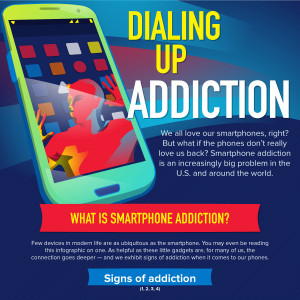Dialing Up Addiction
We all love our smartphones, right? But what if the phones don’t really love us back? Smartphone addiction is an increasingly big problem in the U.S. and around the world.
What Is Smartphone Addiction?
Few devices in modern life are as ubiquitous as the smartphone. You may even be reading this infographic on one. As helpful as these little gadgets are, for many of us, the connection goes deeper — and we exhibit signs of addiction when it comes to our phones.
Signs of addiction (1, 2, 3, 4)
Panic when phone is misplaced
Constant usage, even in social situations
Euphoric feeling when text, email or call comes in
Using phone right before sleep and right after waking
Feeling guilty about phone usage
Physical discomfort, like wrist or neck pain
Trouble in school or at work
Nomophobia
An abbreviation for “no-mobile-phone phobia,” nomophobia is the fear of being without a mobile device. (4)
How Deep Does It Go?
Smartphones are popular and ever-growing in the U.S. and around the world.
6 in 10
U.S. adults who own a smartphone (5)
220 million
Expected number of smartphone users in U.S. by 2018 (6)
2 billion
Expected global smartphone users by 2016 (7)
Featured Programs
How smartphone users feel when their phones are misplaced (4)
Panicked: 73%
Desperate: 14%
Sick: 7%
Relieved: 6%
1 in 5
U.S. adults 18-34 who have used their smartphone during sex (8)
Nearly three-quarters of adults (72%) say they’re within five feet of their smartphones most of the time. (9)
1 in 2
Professional workers who check their smartphones continuously during vacation (10)
Dropping the Connection
With smartphones essentially an extension of ourselves, how can we break our addiction to these devices? (4, 10)
Unplug for 30 minutes
Focus on the people around you
Be aware of what triggers you to grab your phone
Turn off your ringer
Set strict rules about when you won’t use your phone (at dinner, first thing in the morning, in the car)
Once a month, have a smartphone fast, where you put the phone down for an entire day or weekend
Place your phone at least 15 feet away while you sleep
Consider professional treatment with counselor or at technology-addiction facility
Sources:
1. http://www.komonews.com
2. https://www.yahoo.com
3. http://apps.cignabehavioral.com
4. https://www.psychologytoday.com
5. http://www.pewinternet.org
6. http://www.statista.com
7. http://www.emarketer.com
8. http://www.rawstory.com
9. http://www.zdnet.com
10. http://www.webmd.com

